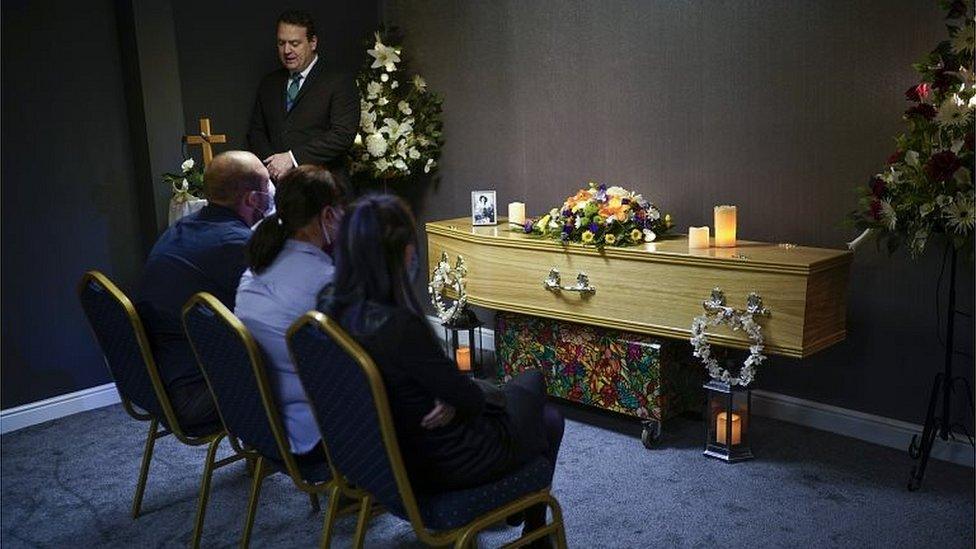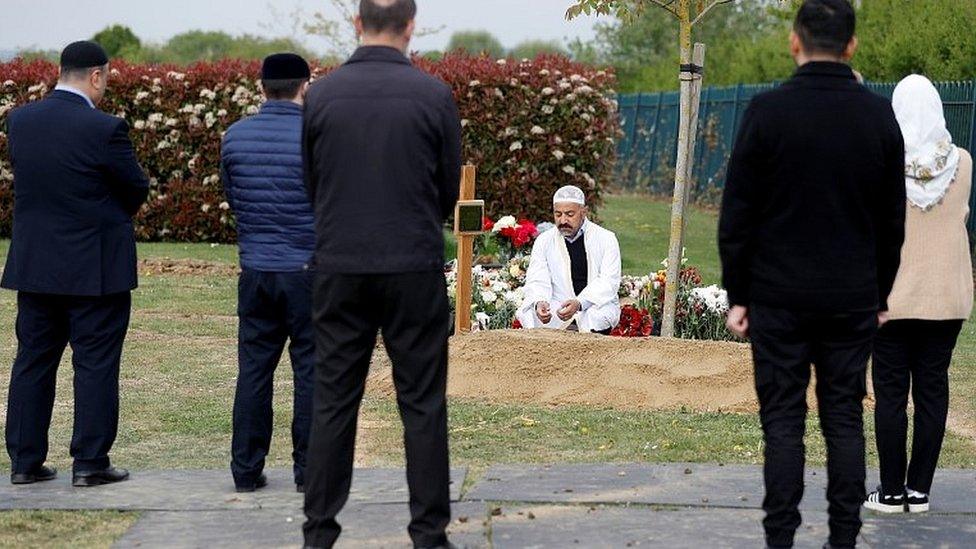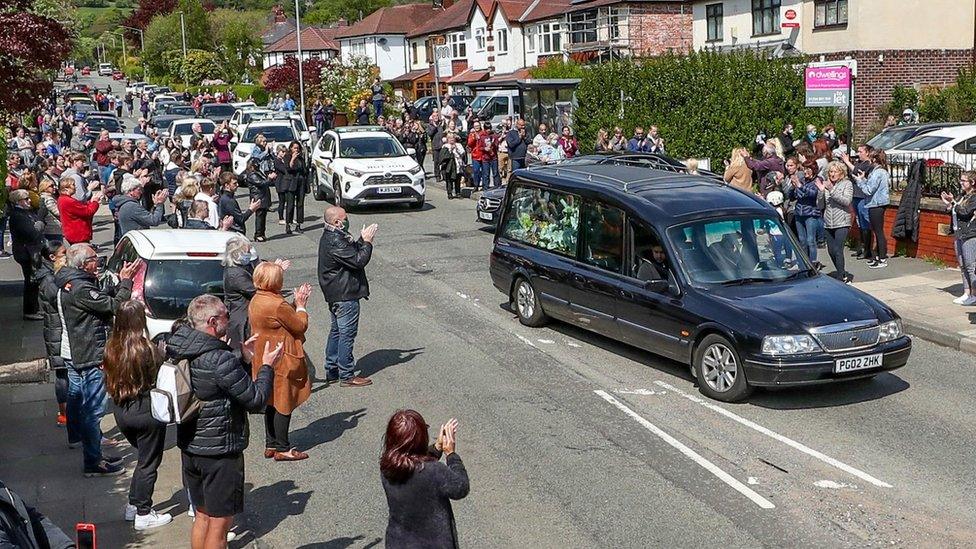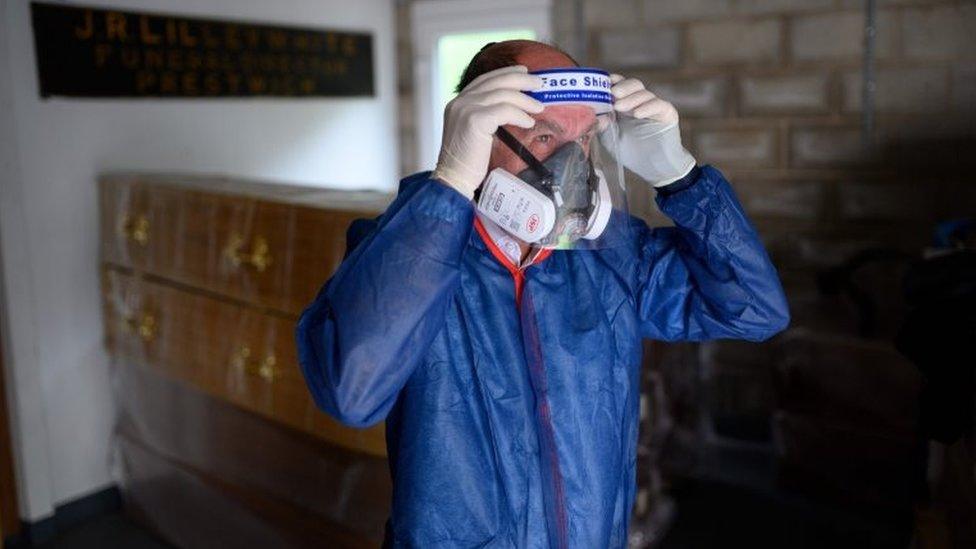Coronavirus: How funerals under lockdown have 'felt incomplete'
- Published

Government guidelines state the number of mourners at a funeral should be "as low as possible"
The coronavirus pandemic has put extra pressure on many workers, not least those involved in funerals, as they have struggled to cope with the strain the thousands of deaths have put on their industry.
About 21,000 people work in the sector and the National Association of Funeral Directors said its members have had to deal with 58,000 more deaths since March than they saw on average in the same period over the last five years.
David Barrington, who runs a funeral directors in Wirral, said he has found it "very hard" as the restrictions imposed by government and local councils have meant not a single mourner has "had the funeral they wanted".
Government guidance states the number of mourners at services should be "as low as possible"; in Wirral, 15 people are allowed to attend, while in neighbouring Liverpool, the number is 10.
Mr Barrington said those restrictions have made it hard for families.
"If you can only invite 10 people, which 10 do you invite? If you're a family of 14, how do you pick the 10?"
Julie Burgess, whose uncle Peter Froggatt died just before lockdown began, said those restrictions had made his funeral difficult.
"He was a real pub man and we couldn't have a do afterwards," she said. "It should have been heaving [but] we couldn't hold that celebration, and the crematorium said only 10 of us could go.
"I feel like it wasn't a proper funeral, it felt incomplete."

Funerals have had to adhere to social distancing guidelines throughout the lockdown
Sher Azam manages a Bradford funeral directors that specialises in Islamic funerals, which generally take place within 24 hours of a death.
He said the lockdown had meant that has not always been possible, which has been difficult for mourners to deal with.
"The majority of the people accept the restrictions, but it is very reluctantly," he said. "Their mind is accepting it, but the heart is not able to accept that.
"Islam says that the living have priority over the deceased, and the disease presents a risk to people, so sacrifices must be made [and] customs may change.
"We knew we had to put these restrictions in, and although people were upset, we knew we had to follow them.
"It wasn't easy. We had to tell families that if the rules weren't honoured, we would have to cancel the funeral. That was very hard. It was second class to what we wanted."

Many funerals, like Dr Saad Al-Dubbaisi's, have seen mourners line the streets
Adele Chaplin, who works as a celebrant for humanist funerals across the UK, said it was not just an issue of numbers, but also of human contact because of the rules on social distancing.
"When I have someone who is reading a eulogy and is overcome with emotion, I normally put my hand on their shoulder [and] I can't do that now," she said.
"Not being able to reassure people with a little bit of touch is very hard. People need that, even if it's just a handshake or a hug at the end."

Funeral directors have had to wear full PPE when dealing with those infected with Covid-19
The Reverend Andrew Dotchin, who is a vicar in Felixstowe, Suffolk, said that lack of contact had not just made the ceremonies hard, but also the days preceding them.
"There's a privilege to holding someone through a difficult journey; I liken it to the boatman on the River Styx (in Ancient Greek myth) who would ferry people to the afterlife.
"There were three funerals where each person moved to a care home where I couldn't visit them and they died in that care home.
"One person said to me before they left: 'I'm going to the care home tomorrow, goodbye.' We had communion, and that was it.
"It was so hard, it takes your heart out of you."
You might also be interested in:
The chaplains at the front line of end-of-life care
Could London jobs go nationwide?
'They made life, and death, so much easier'
However, Mr Barrington said there had been some uplifting moments in all the heartache, as the lockdown has shifted the focus of the mourning for many from the service itself to the journey of the cortege.
He has seen an increasing number of funerals supported by streets lined with mourners, who will applaud as the coffin passes.
"It's just lovely," he said."Funerals should be about supporting the people left behind.
"That's what they are for, really."